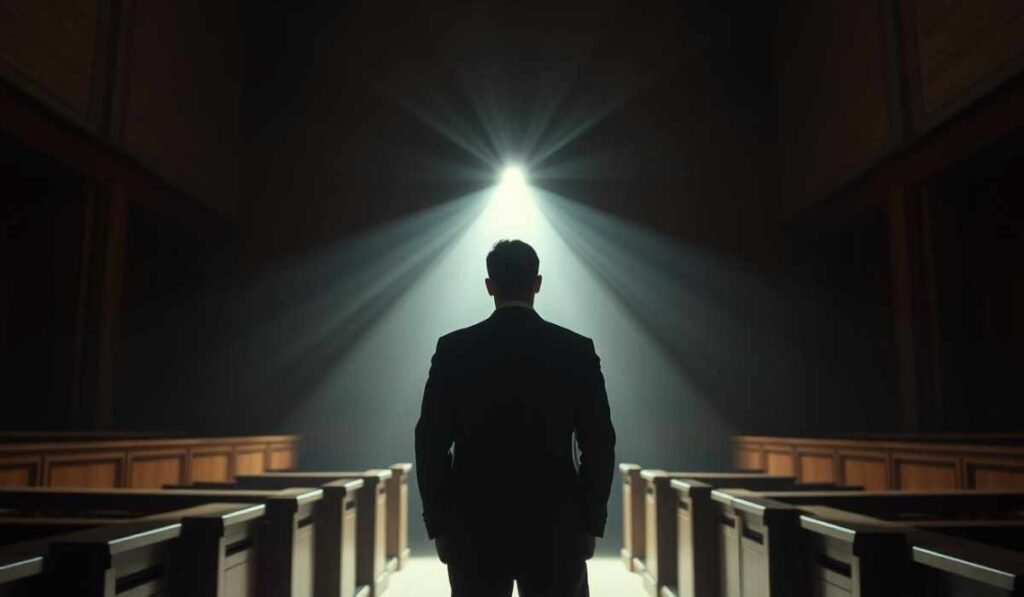The presumption of innocence is key in our criminal justice system. It says every defendant is seen as innocent until proven guilty. This rule makes sure the prosecution must prove guilt beyond doubt, not just make accusations.
This idea isn’t directly in the U.S. Constitution. But, laws and court decisions like Taylor v. Kentucky have made it clear. It’s vital for protecting defendant rights and making sure trials are fair.
Key Takeaways
- The presumption of innocence protects defendants throughout criminal proceedings.
- It is essential to ensure a fair trial and uphold justice.
- The burden of proof rests with the prosecution in a criminal case.
- This fundamental right has roots in historical legal traditions.
- Affirmations by U.S. courts have reinforced its importance in judicial practices.
Understanding the Presumption of Innocence
The presumption of innocence is a key part of fair justice. It means an accused person is seen as innocent until proven guilty. To understand this, we need to look at its legal meaning and the burden of proof in criminal trials.
The Legal Definition
The legal meaning of the presumption of innocence is straightforward. It says an accused is not guilty until proven so beyond a doubt. This rule helps protect people and makes sure evidence is carefully looked at by judges or juries.
It keeps the focus on the prosecution’s job to prove their case. This makes sure criminal trials are fair and just.
The Role of the Burden of Proof
The burden of proof is very important in criminal trials. It’s the prosecution’s job to show strong evidence for their case. If they can’t do this, the defendant is found not guilty.
This rule shows how important the presumption of innocence is. It also helps keep the justice system fair, preventing wrong convictions.
Historical Background of the Presumption of Innocence
The idea of “innocent until proven guilty” is a key part of many legal systems worldwide. It comes from Roman law, where the burden of proof was on the accuser. Over time, this idea has become a symbol of fairness in justice.
Origins in Roman Law
In Roman law, a famous saying was that people accused of a crime were considered innocent until proven wrong. This idea was promoted by leaders like Emperor Antoninus Pius. It helped create the basis for today’s human rights.
This principle is now a cornerstone for protecting the rights of those accused. It makes sure legal processes are fair and don’t unfairly favor the prosecution.
International Recognition
The idea of “innocent until proven guilty” has been recognized worldwide. It’s found in important documents like the United Nations’ Universal Declaration of Human Rights. These documents show its value in international law.
They remind us that everyone deserves fairness in legal systems. This principle is part of our commitment to human rights. It shows our duty to ensure justice is fair for all.
The Importance of the Presumption of Innocence in Criminal Trials
The presumption of innocence is key in our justice system. It protects people from being wrongly accused. This rule makes sure everyone gets a fair trial.
This idea is important in court cases. It shows how our legal rights are protected.
Protection Against False Convictions
It says people are innocent until proven guilty. This stops false accusations from leading to wrong convictions. It makes sure the court needs strong evidence to convict someone.
Without this rule, people could be wrongly punished. It keeps the focus on facts, not guesses or feelings.
Impact on Legal Proceedings
This idea changes how court cases work. It treats defendants fairly, letting them defend themselves. This makes trials fairer and builds trust in the justice system.
When the prosecution must prove guilt, it shows justice is thorough. This makes sure justice is done right.

Modern Implications of the Presumption of Innocence
We face big challenges today with the idea of “innocent until proven guilty.” Media and public opinion often judge people before they go to trial. This can make it hard for jurors to be fair and can change how we see a defendant’s guilt. It’s a big problem for the fairness of our legal system.
Challenges in Practice
The idea of “innocent until proven guilty” meets many obstacles. Media coverage can make people think someone is guilty before they’re tried. Defendants often have to fight against these ideas instead of being judged fairly by the evidence. We need to work hard to keep our legal system fair and impartial.
Legal Protections
Even with these challenges, there are laws to protect the idea of “innocent until proven guilty.” Laws in different places make sure defendants get a fair trial. They also protect against being forced to say something that could hurt them. Laws aimed at fixing the justice system are key to keeping our rights safe.

| Modern Challenges | Legal Protections |
|---|---|
| Media influence leading to prejudgment | Requirement of fair trials to ensure impartiality |
| Public opinion bias regarding defendants | Protection against self-incrimination |
| Pressure on jurors from societal statements | Rights to legal counsel and representation |
| Widespread misinformation about case details | Challenges to uphold due process strategies |
Conclusion
The idea that someone is innocent until proven guilty is key to our justice system. It shows our promise to treat everyone fairly. This idea helps protect people from being wrongly accused and keeps the public’s trust in the law.
Today, we face challenges that test this idea. But keeping it strong is vital. It makes sure justice is fair and unbiased. Even though it’s not always easy, it’s essential for treating everyone fairly.
Protecting the idea of innocence is critical for our justice system. It keeps us safe from unfair treatment. Let’s work together to make sure our justice system values this principle and seeks fair outcomes for all.
